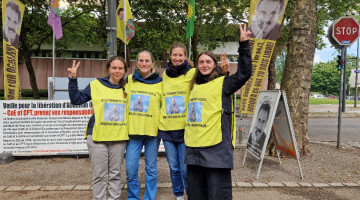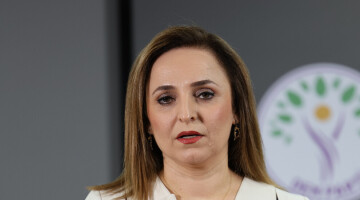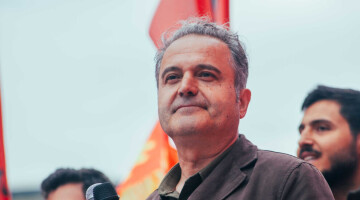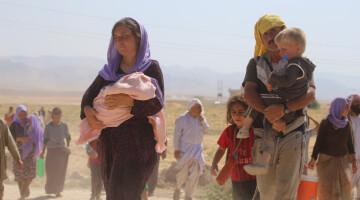The burning of a Koran in front of the Turkish embassy in Stockholm by the Danish right-wing extremist Rasmus Paludan has increased tensions in relations with Turkey. Erdogan reacted against Sweden, saying, "If necessary, we can convey a different message about Finland." Erdogan also repeated these words in a subsequent parliamentary group meeting of his party, AKP. He openly said that he would agree to Finland's NATO membership while maintaining his veto against Sweden. On the same day, Swedish Prime Minister Ulf Kristersson blamed foreign powers for the Koran burning.
As Turkey's elections approach, it is rumoured that Erdogan will use this incident in Sweden and his right to veto the NATO accession process for domestic election campaigning. Yücel Özdemir, a journalist living in Germany, recalls that Erdogan has already used an anti-Western stance as a campaign tool in the constitutional referendum and in the 2018 elections. Özdemir believes that a similar path will be taken in these elections. However, he also emphasises that the intensification of the war in Ukraine will lead to changes in Turkey's policy of balance between Russia and the West.
Yücel Özdemir spoke to ANF about Erdogan's election campaign strategy and relations with Europe.
NATO tensions between Turkey and Sweden escalated after the Koran burning in Stockholm by far-right politician Rasmus Paludan. Erdogan said that Turkey would take a different stance towards Sweden and could convey a message about Finland. Turkey has been negotiating with these countries for some time with the permission of NATO. How is all this handled in Europe, from the Koran burning to these accession talks?
It has been clear for some years that there are tensions between Europe and Turkey in general, or between NATO and Turkey. There was a very intense discussion within NATO that Turkey would shift its centre of gravity by buying the Russian S400. Then, at the NATO summit in Madrid, Erdogan partly showed that he wants to pursue a harmonious policy with the West by changing axes. However, at the point we have reached now, the issue of his veto against Sweden and Finland shows that he is not in harmony with NATO.
When asked how long this veto would last, it was said that there were hardly any possibilities of resistance. This is exactly what we expected. In particular, names were mentioned for the extradition of people who oppose Turkey or who are called "terrorists" by Turkey in inverted commas. Turkey demanded their extradition. We expected that there would be some concession on this issue and that Sweden would make some symbolic gestures. We did not expect such a moment of crisis.
But it was not so...
Yes, that was not the case. Sweden has softened its stance on the extradition of persons specially wanted by Turkey and on the arms embargo under public pressure. Sweden will supply Turkey with the weapons it wants, and it has already become clear that there is no major problem here. However, the Koran burning has also strengthened Turkey on this veto issue. It is of course clear who burned the Koran, because the Swedish government would not do such a thing and would not stand behind it. Ulf Kristersson, the Swedish Prime Minister and at the same time President of the EU Council, has spoken out in this context and openly stated: "This is a game of foreign powers".
But is Kristersson referring to Russia when he speaks of foreign powers?
In the end, it is clear that the normalisation of relations between Turkey and Sweden and Turkey's approval of NATO are directed against Russia. And it is noteworthy that the perpetrators are right-wing extremists. In recent years, we have noticed that there are contacts between Russia and far-right, fascist organisations in Europe. There have also been contacts with right-wing extremist organisations in Austria. There has even been talk of Russia manipulating the elections in these countries. I think the Swedish Prime Minister is referring to Russia by this. Of course, we do not have complete information. Has Russia really played an active role and mobilised its agents in this region? We do not know whether there is an attempt to draw conclusions from an already existing problem and to strain relations between Turkey and Sweden.
There is an opinion that Erdogan wants to use the crisis in Sweden as an election campaign tool. Do you think this will give Erdogan the impetus he wants?
As far as we can see, one of the main pillars of this issue is to direct it towards domestic politics. We saw this both in the constitutional referendum and before the 2018 elections. At that time, the anti-Western stance played a very important role in Erdogan's election campaign strategy. For example, he accused the then German Chancellor Angela Merkel of Nazism. There was even an intense campaign against the AKP's election campaign and relations were strained. There were also major tensions with the Netherlands and diplomatic relations were broken off for a long time. At that time, the Netherlands did not allow an AKP minister to hold a meeting there.
All this has created an atmosphere in which a political leader does not do what NATO wants and appeals to the feelings of voters at home and in Europe with an anti-Western stance. I think that this possibility is also very likely in this election campaign. Erdogan's visit to Berlin has been cancelled. There were discussions about whether the visit would take place or not. In the run-up to Erdogan's planned visit, an AKP deputy came to Germany and called for PKK supporters and FETÖ members to be exterminated in Europe just as they were in Turkey. Germany reacted to this, and according to information from diplomatic circles, there is still a government stance against the AKP's election campaign in Germany. Especially in the foreign ministry.
So is this the reason for the cancellation of Erdogan's visit? Is the door opening to a new crisis?
Yes, that is one of the reasons why Erdogan did not come. Because when Erdogan comes to Germany, he has a schedule. He meets with citizens, even if it is not on election night, and holds meetings in large halls with parts of his own supporters. In a way, he may have wanted to kick off the election campaign in Europe in Berlin, but it didn't come to that. Even if there is no intense debate about the cancellation of this visit on an anti-German basis for the time being, I think Erdogan will try an anti-Western and anti-European initiative in the coming days as the election mood rises, as he did in 2018.
On the other hand, since Sweden also holds the current EU Presidency, Turkey has at least symbolically sent a request to Sweden on the progress of the negotiations. It is rumoured that Turkey is asking the European Union to move the stalled relations forward, but of course Sweden cannot do this alone. In general, it is about the mechanism and the course of the European Union itself, but in the coming period, this will be one of the most important pillars in the election campaign in Turkey.
Speaking of negotiations, we have noticed for a long time that the European Union has not taken any serious steps towards democracy and human rights in Turkey. It does not even activate its own mechanisms against Turkey, which does not take into account the European Conventions on Human Rights or the rulings of the European Court of Human Rights. Now you say that Turkey is demanding a resumption of negotiations. It is not known how this process will take place, but the European Union is currently busy with the Ukraine war. In this process, for example, Turkey's behaviour, the renewed shift of its axis towards Russia, its right to veto NATO membership, etc. are important. If we put all these aspects side by side, will a new perspective emerge for Europe's attitude towards Erdogan?
To be honest, I am also a little curious about this issue and I am watching it. Will the European Union and NATO see these elections as an opportunity to get rid of Erdogan? We don't have a clear answer to this question at the moment. Currently, there is no atmosphere in Europe that would favour a candidate who would disgrace Erdogan and oppose him with all his might, all his mechanisms and all his propaganda. The European Union has learned to live and work with Erdogan. In the past, the EU criticised him as an authoritarian regime for violating human rights and not recognising ECtHR rulings, and sometimes relations were strained. Especially if we look at the relations between Germany and Turkey in 2017-18. But then they suddenly normalise, as if nothing had happened.
There are mutual obligations between the two sides. At the moment, it suits the European Union that Erdogan duly fulfils the mandate related to the "refugee issue" and that trade relations remain as they are. The arms issue also continues. However, the Ukraine axis is a problematic situation within the global balance. Until 24 February 2022, the role of countries like France and Germany in world politics was generally based on maintaining a close relationship with Russia, at least without confronting it. Germany gained very important advantages here. With the change of government, however, there has been a partial change of course in German foreign policy. And not only in Germany, but also in Europe. There has been a distancing from Russia and a rapprochement with the transatlantic axis. The current mood is closer to America.
Where does Turkey stand in this equation and how long can it maintain its position?
Turkey maintains its place in this equation. Although Turkey is a member of NATO, it has not acted like Germany and France, but has kept its relations with Russia in balance. It is also continuing its relations with the West. But how long will this last? As far as we can understand, Erdogan is going to the extreme. There is certainly a lot of pressure within the European Union or NATO to abandon this policy and isolate Russia, and the US has also recently expressed itself in this direction. In particular, if Sweden and Finland are not admitted to NATO because of Turkey's veto, there seems to be a change of axis against Turkey. So far, there has been partial tolerance of Turkish relations with Russia. They are even happy for Turkey to play the role of mediator. They were happy with Erdogan's behaviour in opening the grain corridor. But if we look at the lifespan of this thing in the Ukrainian arena, it is not very long.
Germany and the USA are now sending tanks to Ukraine. Does this indicate an escalation of the conflict and what consequences would this escalation have for Turkey? Could the politics of balance be disturbed by the course of the war?
The war is not currently being conducted on the basis of negotiations. Germany has recently promised tanks to Ukraine. In addition, there are now intense discussions about the awarding of fighter jets. The Chancellor initially said no, but the war course is hardening more and more. At a meeting with Biden, Scholz promised the delivery of tanks on the condition that the USA also send some. Later, Biden said, "We will send Abrams, but their deployment and cost is too high." At the moment it is uncertain when and to what extent they will be deployed. But Germany, of course, has said it will supply 14 tanks in the first phase. Small tanks have already been sent before.
This paves the way for other NATO member states to send Leopard tanks to Ukraine. So, it is important. Sweden, Finland and the Baltic countries will send weapons towards Ukraine, and the scenario is this: In the war strategy based on Ukraine not winning and Russia losing, Crimea will be militarily taken by Russia in a major offensive in the spring. This is also a scenario for an intense war from the Ukrainian territories controlled by Russia. We do not know to what extent this scenario will happen.
The intention of the West and Ukraine is to evacuate all Russian-controlled territories and bring them under their control. This includes Crimea. This is rumoured from time to time. If the war reaches this stage, it will mean that relations between Russia and Turkey will be discussed in a different equation. As the war intensifies, I think the pressure on Turkey to limit its relations with Russia will increase. In fact, it will increase greatly.
I mean, how long can Erdogan's political life last? We don't know. But another important point is that when we look at the course of Turkish foreign policy, the National Alliance does not make clear statements about relations with Russia. Nor does it say anything clear about the West. The axis of maintaining the current policy is more pronounced. There is talk of a foreign policy that is oriented towards Turkey's interests. In other words, even if Erdogan goes, I don't think there will be a sharp turn in the new period.














